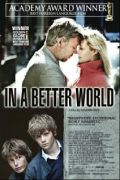
Denmark 2010
Directed by
Susanne Bier
113 minutes
Rated MA
Reviewed by
Sharon Hurst

In A Better World
Synopsis: Anton (Mikael Persbrandt) is a doctor who spends part of his time in refugee camps in Africa and the rest at home in Denmark, where he has a young son, Elias (Markus Rygaard), and an estranged wife, Marianne (Trine Dyrholm). When troubled, motherless Christian (William Nielsen) turns up at school, the developing friendship between the boys threatens to create trouble, and even endanger, lives.
In A Better World is wonderful film. It has just won this year’s Oscar and Golden Globe for Best Foreign Film, and deservedly so, as it manages to draw seemingly disparate threads and settings together to examine what are essentially related issues. The film’s Danish title, Haevnen, means revenge, and so many of the scenes and episodes will lead the audience to reflect upon this issue even to the point of wondering “what would I have done in this situation?”
In Kenya, Anton is constantly confronted with the ghastly truth of tribal warfare and violence towards women, much of it initiated by an individual the locals call "The Big Man". Several disturbing scenes have Anton attempting to repair brutal and sickening acts of mutilation on local pregnant women. Through all the dramas Anton manages to keep a level head and a relatively peaceful demeanour. This is again evident when he returns home to find that his son has got into trouble when he and new friend, Christian, finally retaliated against one of their bullying classmates. Anton tries to teach the boys a gentler way of responding, a turn-the-other-cheek style of dealing with conflict, but the boys perceive this as weakness and escalate their responses into even more retaliatory, aggressive behaviour. In turn, later in the film, back in Kenya, Anton’s gentle responses will be sorely tested when he is faced with one of the biggest moral dilemmas of his life.
There is immense beauty as well as a pervading sense of sadness in this film. Anton is like some calm centre in a crazy world, and the wonderful performance of Persbrandt grounds the film in a really inspiring manner. Equally powerful are the performances of the two young actors as the boys, and I was constantly impressed by the absolutely authentic feel of the school scenes and the friendship. Another notable role is that of Claus (Ulrich Thomsen), Christian’s father, whose son constantly blames him for the death of his mother, a circumstance which has turned Christian into a very angry young man. Also touching is the relationship between Anton and Marianne as they discuss possible divorce, yet all the while one senses the strong bond between them and hopes for a different outcome.
The dialogue is beautifully scripted and the scenes of the Africans in the refugee camp are tenderly shot, with the vulnerability of the women and children so evident. The criss-crossing between Africa and Scandinavia provides strong contrast visually and in terms of the film’s pace, with the two threads linking seamlessly together.
Director Bier has an interest in the universal nature of the human condition. Her other films known here, Brothers (2004) and After The Wedding (2006) both make reference to non-Western cultures and in this reflection on the more violent instincts of human beings, she draws attention to the communalities of these baser human traits, regardless of what part of the world we are dealing with.

Want more about this film?


Want something different?




